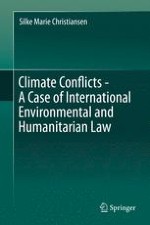2016 | OriginalPaper | Buchkapitel
5. Legal Consequences
verfasst von : Silke Marie Christiansen
Erschienen in: Climate Conflicts - A Case of International Environmental and Humanitarian Law
Aktivieren Sie unsere intelligente Suche, um passende Fachinhalte oder Patente zu finden.
Wählen Sie Textabschnitte aus um mit Künstlicher Intelligenz passenden Patente zu finden. powered by
Markieren Sie Textabschnitte, um KI-gestützt weitere passende Inhalte zu finden. powered by
